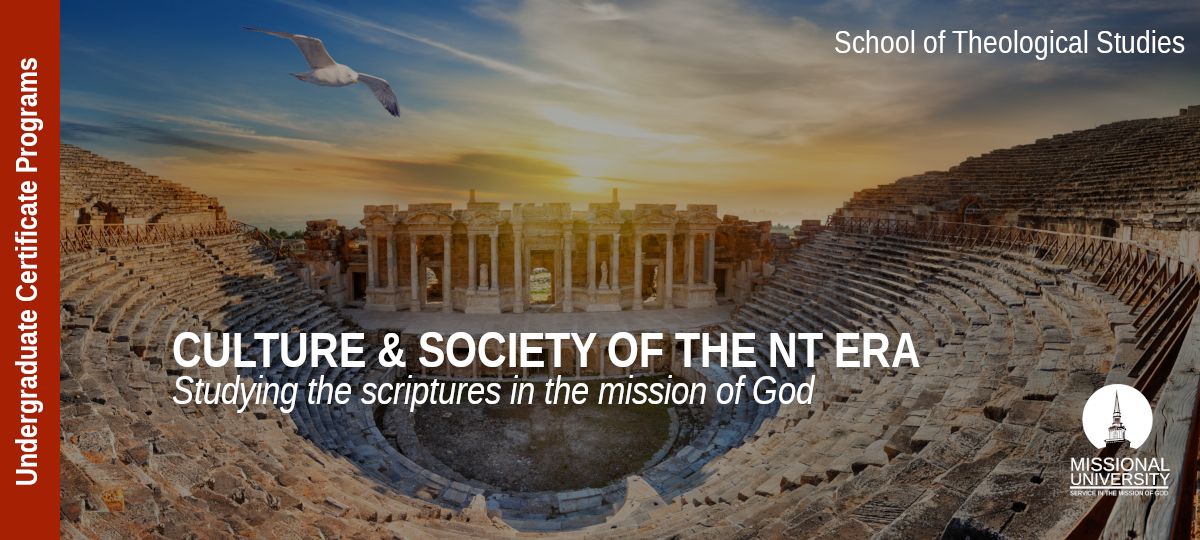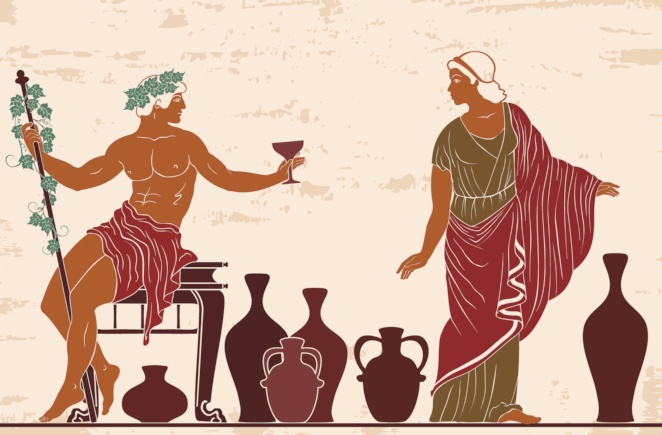
Online Undergraduate Certificate in
Culture & Society of the New Testament Era
☀ Totally Unique Program = only available at Missional University
Expand Your Missional Service Today!
REQUEST INFORMATION
Ready to learn more about the
Undergraduate Certificate in
Culture & Society of the New Testament Era?
LEARN MORE NOW
The Undergraduate Certificate in the Culture & Society of the New Testament Era provides the student of the sciptures with a deep understanding of the impact the interaction of Roman culture and society with Greek/Hellenistic culture and society had on the ideas and social setting of the New Testament writings.
A missional interpretation of scripture requires the biblical student to study the text within it's own social, cultural, economic, political and religious context as a foundation for understanding it's relevance to today's sociocultural setting. Students gain insights from the Undergraduate Certificate in the Culture & Society of the New Testament Era as they study ways in which the first-century society was both influenced by Hellenistic ideas and customs but also dominated by Roman law, governmental & political structures, and ideas of class, status, and military influence.
Program Features
-
Integrated practicums allow you to gain valuable real-world experience
-
Learn from academic practitioners from around the world
-
Credits earned in this certificate program can apply to a Missional University Bachelor degree program
Course Effort
Course Length
Credits Required
Program Cost
What Will I Study?
We offer the most comprehensive approach to studying the scripture in the mission of God.
Examines the biblical theological foundations of God's plan for global redemption throughout the Old and New Testament. The student will explore the eternal purpose of God for humanity, the state of those who have not heard the gospel, and the application of the missional mandate to various cultures.
Traces the religious and political developments concerning Jews in antiquity by focusing on the inter-testamental period. Special emphasis is laid on Hellenistic culture and Roman administration, as they come to inform and influence the political and religious arenas in the period of the Second Temple Judaism. The original sources are drawn from religious as well as secular texts from the period, including Jewish authors, such as Philo and Josephus, and other non-Jewish historical writings, such as Tacitus and others.
Examines the varied relations between Jews and Christians from antiquity to the present, focusing on the ways in which Jews and Christians have thought about and represented the other, and the issues that have divided the two communities. We will trace the origins of Christian anti-Judaism and examine how theology, culture, politics, and economics contributed to the formation of anti-semitism in the ancient, medieval and modern periods. We will also study how Jews have understood Christianity and responded to Christian claims about Jews and Judaism.
The development of ancient Greek and Roman religions from their inception to the rise of Christianity in the first century are covered. Special attention is given to the continuity between Greek religion and Roman religion, as well as the rise of the imperial cult after the end of the republican regime, and the incorporation of oriental cults into the framework of Roman society and religious practices.
Examines the development of the New Testament against the background of ancient empires. Students will understand the cultural claims of Jews and Christians that their God was the true King and Emperor. Students will engage in discussions, book reviews, research, quizzes, and other assignments to understand Jesus’ teachings in the shadow of the ancient empires.
A focus on religious art in the Judeo-Christian tradition, including ancient Jewish and early Christian art, as well as tracing the later developments of Christian art through the ages. The course will also addresses issues of debate and controversy regarding religious art in the monotheistic traditions of Judaism and Christianity, such as the iconoclastic conflict and the Seventh Ecumenical Council in 787. The distinct eastern and western traditions that emerge in the Catholic and Eastern Orthodox traditions will be highlighted, as well as the effect of the Protestant Reformers on Christian art in the West.
When Can I Get Started?
We offer multiple start dates each year to give you flexibility in your education, life and work schedules.
JANUARY
MARCH
MAY
AUGUST
OCTOBER
A Career in Joining the Mission of God
Is this Your Mission?
Biblical Studies Blogger, Biblical Studies Editor, Biblical Studies Educator, Biblical Studies Teacher, Biblical Studies Writer, Church Minister of Missions, Curriculum Writer, Director of Missions, Pastor, Church Planter, Missionary, Discipleship Director
Request Information Now
How Much Will it Cost?
We offer tuition based upon country of residence. According to the Human Development Index, all countries around the world fall into one of four categories:
-
(Tier 1) - Very High Human Development
-
(Tier 2) High Human Development
-
(Tier 3) Medium Human Development
-
(Tier 4) Low Human Development
Our tiered global tuition makes higher education affordable for everyone world wide.

TIER COUNTRIES
100% Tuition
$295
per credit hour
3 credit course
$885

TIER COUNTRIES
80% Tuition
$236
per credit hour
3 credit course
$708

TIER COUNTRIES
60% Tuition
$177
per credit hour
3 credit course
$531

TIER COUNTRIES
40% Tuition
$118
per credit hour
3 credit course
$354
Tiered tuition based on country of origin and scholarships available. Find your country of residence here for more information.
Tuition may be further reduced by participating in the Sponsorship Program.
